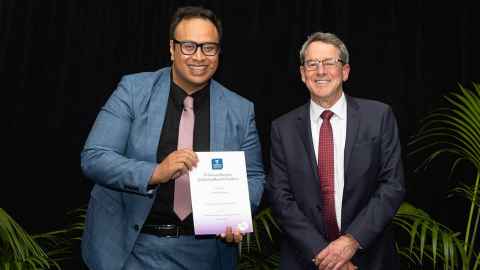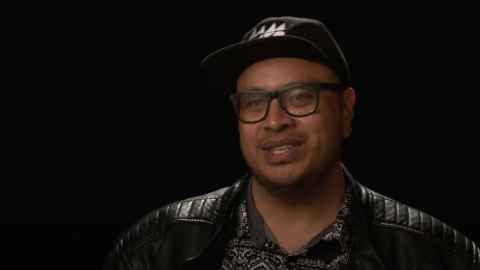Pacific scholar launches book on queer Korean culture
5 April 2023
Queer scholar Dr Seuta’afili Patrick Thomsen explores queer culture in Korea in new book: From Sleepless in Seattle to I Seoul You: Korean Gay Men and Cross-cultural Encounters in Transnational Times.

Dr Seuta’afili Patrick Thomsen (Vaimoso, Vaigaga) is a senior lecturer in the Faculty of Arts, and a queer Pacific scholar who completed his PhD at the University of Washington, Seattle in 2018.
Thomsen is also the Principal Investigator for the Manalagi Project at Waipapa Taumata Rau, New Zealand's first Pasifika Rainbow Health and Well-being Project to be funded by the Health Research Council of NZ.
Today he is acknowledged and celebrated as an author, following of the launch for his book From Sleepless in Seattle to I Seoul You: Korean Gay Men and Cross-cultural Encounters in Transnational Times. It’s based on his PhD research which explores gay Korean men’s experiences around sexual visibility.
The launch took place at the University's Fale Pasifika on April 4.
Drawn from Thomsen’s lived experience and talanoa with Korean gay men between Seattle and Seoul, the book centres transnational, migrant and racialised realities, contributing to the complication of West-centric ideas of gayness and coming out.
When Thomsen was hit with the news that his ex-partner had to marry a girl as opposed to living a queer life, it became the catalyst to undergoing research that sought to better understand queer communities in Korea.
“I wanted to better understand why it was so hard for Koreans I met to choose a queer life. I didn’t have a sense of what queerness looked like from a Korean perspective either, and coming from my own Sāmoan context, I wanted to explore how culture impacts an individual’s ability to come out in Korea,” Dr Thomsen says.
What Thomsen found was various similarities and parallels between Sāmoan and Korean culture, with kinship and family being the foundational institution of well-being. However, he also found that the expression around queerness and sexuality in general in Korea was frowned upon, and queer theory was still very Western at the time.
“Queer worlds are often theorised using Western frameworks of knowledge systems and power. In this book, I bring diversity to the discourse, by exploring the stories of Korean gay men in and between Seoul in Korea and Seattle in the US.”
“This book tries to explore queerness in the Korean context through a Pacific research lens. I used Pacific research methodologies to guide the development for our interview protocols, such as talanoa. I also used Pacific ethics to centre the discussion and analysis rather than using a more rigid approach around interview protocols often used by Western researchers."

Thomsen explains that queer studies is still a subject that hasn’t fully had it’s reckoning in our part of the world, and that in the Korean study space, it’s been non-existent until recently.
“It’s slowly becoming a discipline,” he says.
“We have many Western researchers who have come in with critiques saying that Korea is backward, behind, and that the country needs to catch up in regards to queerness and visibility.
"As a Sāmoan I see this as potentially problematic, as this is a very colonial framing, it’s making use of an already marginalised people to re-inscribe colonial power relationships while seeking to develop queer recognition. We can be more nuanced than that.”
“There can be a problem in cross cultural studies where scholars apply a limited lens, without reflexivity, basing judgments on their own standards, which can easily demean, undermine and exercise some sort of power over cultures that are not their own. I definitely tried to avoid that when carrying out this work."
Dr Thomsen says he had a responsibility to all participants in his research, to ensure their stories became the central point of where the knowledge was generated, as opposed to using their words to fit into a theoretical framework.
“I wanted to do this study my way, I could see so many parallels between Korean and Samoan culture.”
Media queries
Te Rina Triponel | Kaitohutohu Pāpāho Māori, Moana nui a Kiwa
E: te.rina.triponel@auckland.ac.nz